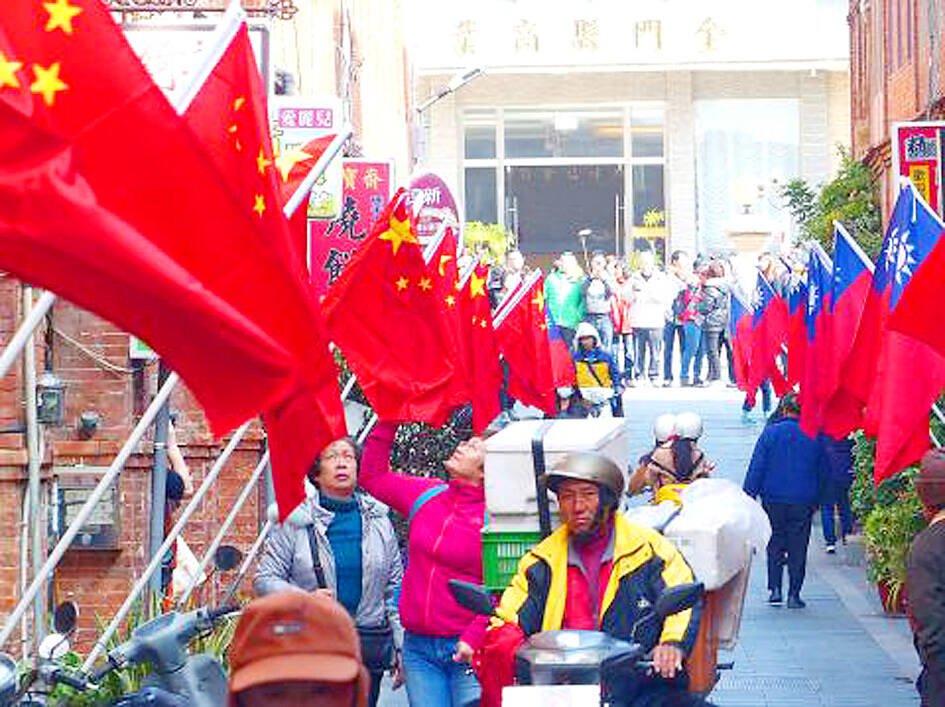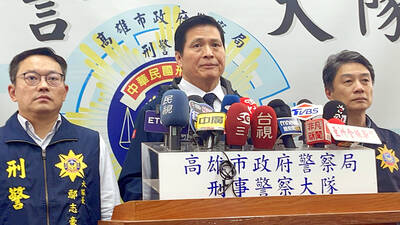The Chinese Communist Party’s (CCP) is using “united front” tactics on Taiwan’s outlying islands of Kinmen and Matsu to form the effect of “one country, two systems,” a Taiwanese academic said yesterday.
The Mainland Affairs Council has previously warned of the CCP’s “united front” work on Taiwan’s outlying islands, using Kinmen as a new model “to form an unnamed, but real ‘one country, two systems’ there.”
Sources have said that the CCP, in a bid to accelerate progress toward integration and unification with Taiwan, has permitted Taiwanese to apply for Chinese ID cards in its Fujian Province without needing to turn in their Taiwan passport or ID card, with the Chinese province allowing Taiwanese to retain both documents.

Photo: Wu Cheng-ting, Taipei Times
The CCP has also proposed the idea of a “Kinmen-Xiamen Common Living Circle,” with the aim of building an integrated transportation network between Taiwan’s Kinmen County and China’s Xiamen.
It also hopes to construct a bridge connecting Kinmen and Xiamen Xiangan International Airport, which could further integrate the two cities.
Soong Kuo-cheng (宋國誠), a researcher on Taiwan-China affairs at National Chengchi University’s Institute of International Relations, yesterday said that the two sides of the Taiwan Strait have different systems, so even though China is using economic incentives and “united front” tactics on Taiwan, it cannot change the difference between democracy and autocracy.
However, if the CCP wants to sabotage Taiwan’s democratic system, it can do so if there are local collaborators in the legislature, constantly cutting budgets and passing controversial bills, causing social disorder, he said.
Social disorder can be seen as being part of China’s unification work from within Taiwan, Soong said.
The cost of a military invasion is too high for Beijing, and Taiwanese are unlikely to accept its so-called “peaceful unification,” so the CCP sows discord among Taiwanese in the hope that Taiwan would collapse from within.
The CCP also offers some benefits to Kinmen residents, such as by provisioning water to solve its water demand issues and allowing tour groups to visit the island, claiming this helps to revitalize Kinmen’s tourism industry.
Beijing uses Kinmen to demonstrate its “one country, two systems” and to create the impression of Taiwan and China being “one family.”
If Kinmen became integrated with Xiamen as if they are one city, the CCP would say that its “one country, two systems” policy could be replicated with the whole of Taiwan, he said.
The CCP could start from small areas and gradually expand to wider areas, and once it demonstrates that the “one country, two systems” is effective, local residents might also support it, he added.
Soong said the CCP’s “united front” strategy is using the Legislative Yuan to do its unification work and also using Kinmen and Matsu to form a “one country, two systems” effect.
Asked how Taiwan should respond to Beijing’s strategy, Soong said that on tourism, Chinese group visitors to Taiwan are regulated by the Act Governing Relations Between the People of the Taiwan Area and the Mainland Area (兩岸人民關係條例), so they can only enter and leave Taiwan as a group within certain time permits, he said.
Taiwanese do not need to reject the idea of having Chinese tourists in Taiwan, he said.
What is more serious is the potential integration of Kinmen and Xiamen, or Matsu and Fuzhou, into one big city, as this type of “united front” tactics would have a greater impact on the public and governance structures, he said, adding that if China wants to extend its bridge from Xiamen to Kinmen, there could be national security issues, which the government must deal with very carefully.
Soong said the CCP is implementing an “island hopping” strategy — first Kinmen and Matsu, then moving on to Taiwan proper — to realize its goal.
Taiwan must take precautions and guard against this, he said.

Twenty-four Republican members of the US House of Representatives yesterday introduced a concurrent resolution calling on the US government to abolish the “one China” policy and restore formal diplomatic relations with Taiwan. Led by US representatives Tom Tiffany and Scott Perry, the resolution calls for not only re-establishing formal relations, but also urges the US Trade Representative to negotiate a free-trade agreement (FTA) with Taiwan and for US officials to advocate for Taiwan’s full membership in the UN and other international organizations. In a news release announcing the resolution, Tiffany, who represents a Wisconsin district, called the “one China” policy “outdated, counterproductive

Actress Barbie Hsu (徐熙媛) has “returned home” to Taiwan, and there are no plans to hold a funeral for the TV star who died in Japan from influenza- induced pneumonia, her family said in a statement Wednesday night. The statement was released after local media outlets reported that Barbie Hsu’s ashes were brought back Taiwan on board a private jet, which arrived at Taipei Songshan Airport around 3 p.m. on Wednesday. To the reporters waiting at the airport, the statement issued by the family read “(we) appreciate friends working in the media for waiting in the cold weather.” “She has safely returned home.

TRUMP ERA: The change has sparked speculation on whether it was related to the new US president’s plan to dismiss more than 1,000 Joe Biden-era appointees The US government has declined to comment on a post that indicated the departure of Laura Rosenberger as chair of the American Institute in Taiwan (AIT). Neither the US Department of State nor the AIT has responded to the Central News Agency’s questions on the matter, after Rosenberger was listed as a former chair on the AIT’s official Web site, with her tenure marked as 2023 to this year. US officials have said previously that they usually do not comment on personnel changes within the government. Rosenberger was appointed head of the AIT in 2023, during the administration of former US president Joe

ON PAROLE: The 73-year-old suspect has a criminal record of rape committed when he was serving in the military, as well as robbery and theft, police said The Kaohsiung District Court yesterday approved the detention of a 73-year-old man for allegedly murdering three women. The suspect, surnamed Chang (張), was arrested on Wednesday evening in connection with the death of a 71-year-old woman surnamed Chao (趙). The Kaohsiung City Police Department yesterday also unveiled the identities of two other possible victims in the serial killing case, a 75-year-old woman surnamed Huang (黃), the suspect’s sister-in-law, and a 75-year-old woman surnamed Chang (張), who is not related to the suspect. The case came to light when Chao disappeared after taking the suspect back to his residence on Sunday. Police, upon reviewing CCTV